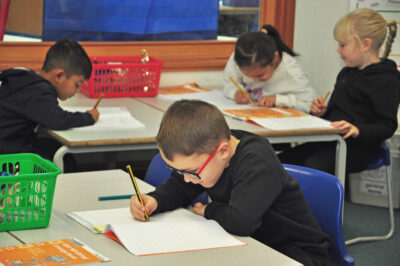At Gallions we believe that the best way to ensure that pupils do well in English is to ensure that they become life-long engaged readers.
Children and staff at Gallions are enthusiastic readers and we endeavour to foster a love and passion for reading in our children from the outset. To this end, we hold a variety of whole school events throughout the year to encourage and develop the passion for reading. We also ensure that teachers make regular recommendations to pupils to encourage reading for pleasure.
Reading for Pleasure

Reading for pleasure at Gallions Primary School aims to establish each child as a lifetime reader based on developing a love of reading. We ensure our children are given a rich curriculum which encourages reading of books and other kinds of texts.
At Gallions we aim to promote the concepts of reading for ‘fun’, ‘enjoyment’ and ‘pleasure’.
What Gallions does to promote reading for pleasure:
- We have age-related fiction and non-fiction within each class via the class book corner.
- Through reciprocal reading lessons, we explore rich vocabulary and complete shared class reading to engage and give opportunities to discuss books as a class.
- Daily Storytime sessions are held throughout the school
- Children have access to the school library as a class during school time and at lunchtime and after school as individuals
- we have pupil librarians who support the running of the library
- Reading takes place both in and outside of the classroom and in and outside of the school. We have reading trolleys out every lunchtime!
- The school encourages links with parents by ensuring every child has a Reading Journal’ that records all reading habits, signed by parents and monitored by class teachers.
- We also ensure that teachers make regular recommendations to pupils to encourage reading for pleasure.
- Authors come and run workshops to excite and engage our children on new books
- In addition, we celebrate reading through themed days e.g. World Book Day and Reading Festivals! to encourage and develop the passion for reading
Reading and Writing – separate subjects:
Once children can read accurately and fluently, we teach reading and writing as separate subjects. Teaching writing separately allows teachers and children to focus on the writing processes and writing skills and allows pupils the freedom to use their own ideas without being constrained by the text they are reading. It prevents writing outcomes from being solely a response to reading and instead allows pupils the freedom to develop and use their own ideas without being overly constrained by the text they are reading.
Writing
From October 2021, we are following the Writing for Pleasure (WfP) pedagogical principles of Young and Ferguson. These include:
- Explicitly teaching the writing processes (how to generate an idea, plan, draft, revise, edit, publish)
- Teachers teach a mini lesson daily and children are invited to apply the principles of this mini lesson to their writing
- Children are given time to write every day
- Writing projects have a purpose and audience
- Children are given time to read, share, think and talk about writing
- Children have the opportunity to pursue personal writing projects
- Teachers carry out ‘pupil conferencing’ to support pupils to further develop their writing
More information can be found about the Writing for Pleasure pedagogy here: https://writing4pleasure.com/
Grammar
Grammar is taught through the writing ‘mini lessons’. Required ‘mini lessons’ will be mapped out for each year group to ensure curriculum coverage. Where necessary, additional discrete grammar lessons may be taught to ensure full coverage of the grammar curriculum. Year groups are taught new content according to the Grammar Progression document, but regular revisiting of previous years’ content is built into our grammar teaching. This ensures that pupils know and remember more of what they are taught.
Handwriting
The Letterjoin handwriting scheme should be taught through explicit teaching from Summer Term in Year 1. Teachers are expected to model this cursive style on the board and in pupil books.
Debating and Oracy
- There is a constant thread through the taught curriculum for opportunities for pupils to develop ’oracy,’ through debating, talk partners, paired and collaborative work, drama, role-play activities, circle time, listening to and discussing stories as well as presentations of learning.
- There are also opportunities for children to develop their ‘oracy’ skills outside of the taught curriculum. These activities include: assemblies, school council, Junior Leadership and school productions.
- Our Year 5 and 6 pupils take part in Debate Mate competitions held across the borough
- Music lessons and singing assemblies supports pupils’ in pronunciation, projection of their voices, use of expression and improving confidence. Our school choir takes part in the annual Young Voices event at the O2 alongside hundreds of other primary and secondary pupils across London.
To find our more about how we teach English at Gallions please read more here .
